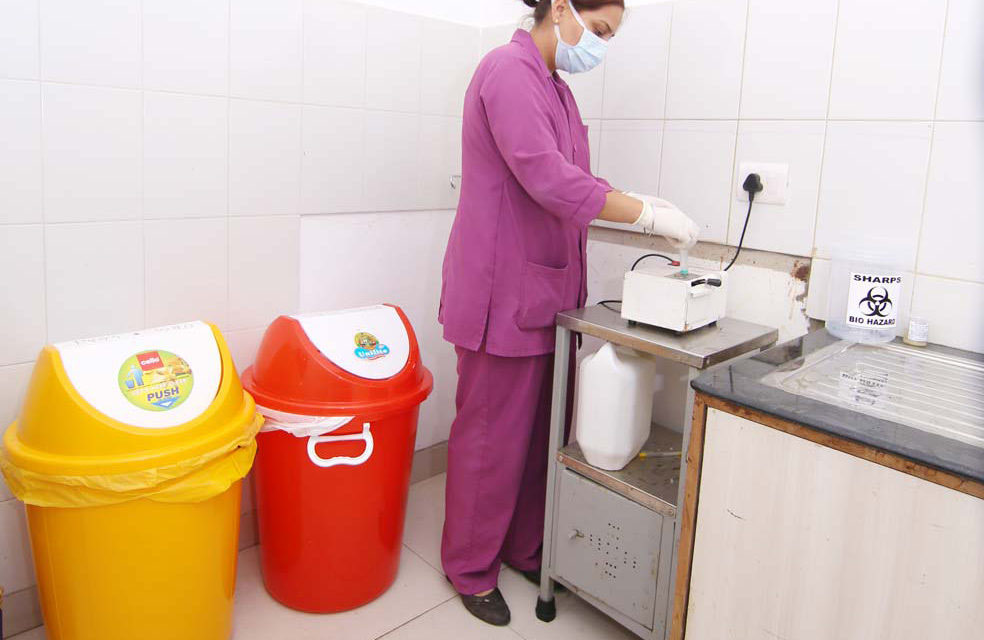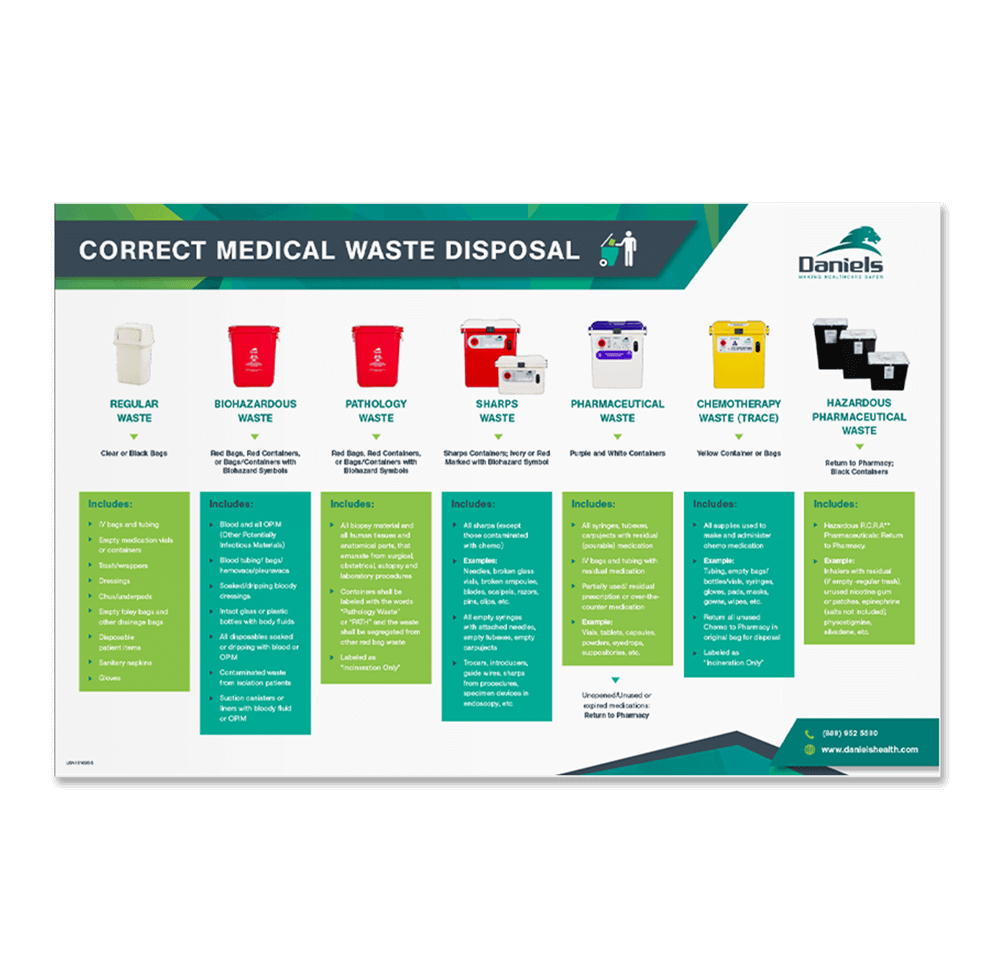Expert Medical Waste Disposal Services: Guaranteeing Compliance and Security
Expert Medical Waste Disposal Services: Guaranteeing Compliance and Security
Blog Article
Navigating Medical Waste Disposal: Necessary Providers for Medical Care Facilities
In the intricate landscape of medical care operations, the management of medical waste is a crucial element that demands careful focus. Medical care centers, whether large medical facilities or small clinics, are left with the responsibility of handling, treating, and throwing away a vast selection of medical waste streams. The intricacies included in navigating with the regulative needs, ensuring correct waste partition, and carrying out secure collection and transport procedures are vital. Recognizing the necessary services that support medical waste disposal is not simply a matter of conformity however likewise an essential component in safeguarding public wellness and environmental wellness. The complexities of this procedure are crucial for healthcare facilities, and the expertise supplied in this world plays a pivotal function in preserving the integrity of medical care systems.
Regulatory Compliance Assistance
For medical care centers, guaranteeing regulatory compliance assistance is essential to keep correct handling and disposal of clinical waste. Complying with regulations set forth by companies such as the Epa (EPA) and the Occupational Safety and Health Administration (OSHA) is crucial to avoid environmental contamination, safeguard public wellness, and stay clear of prospective lawful consequences. Regulatory compliance assistance supplies medical care facilities with guidance on exactly how to correctly set apart, shop, transportation, and take care of various sorts of clinical waste in conformity with local, state, and federal policies. This assistance includes support in creating and executing comprehensive waste administration strategies, performing regular staff training sessions, and carrying out audits to make sure continuous compliance. By partnering with regulative compliance experts, healthcare facilities can stay updated on progressing regulations, mitigate threats related to incorrect waste disposal, and ultimately contribute to a safer and more lasting setting for all.
Waste Segregation Advice

Medical care facilities need to give clear guidelines and training to staff on exactly how to segregate waste successfully. This consists of dividing general waste from harmful materials such as sharps, infectious waste, pharmaceuticals, and chemical waste. Color-coded containers, labels, and signage are generally utilized to assist in waste partition methods. Routine audits and monitoring of waste partition procedures are important to determine any concerns and make needed renovations.
Collection and Transportation Providers

Appropriate collection and transportation services are essential parts of the clinical waste disposal procedure in health care centers. These services guarantee that hazardous products are managed safely and in conformity with laws to secure both the environment and public wellness. Health care centers depend on specialized waste administration companies to supply effective collection and transportation solutions tailored to their requirements.
Medical waste collection entails segregating various sorts of waste at the factor of generation, making use of color-coded bags or containers to identify between basic, hazardous, pharmaceutical, and other waste streams. Educated personnel need to do this task to protect against contamination and make certain appropriate disposal. As soon as gathered, the waste is carried in dedicated automobiles equipped to manage dangerous products securely. These vehicles stick to rigorous security standards and comply with marked routes to certified therapy facilities for disposal through techniques such as landfilling, incineration, or sterilization.
Treatment and Disposal Solutions
In the world of clinical waste disposal for health care facilities, after the important stage of collection and transportation services, the emphasis moves towards implementing effective therapy and disposal remedies. Treatment services frequently include processes such as autoclaving, which makes use of vapor under pressure to sterilize the waste.
Disposal services include the last action in the clinical waste management process. Recycling and resource healing are also getting grip as lasting disposal choices for particular types of medical waste materials.
Efficient click here now therapy and disposal solutions are extremely important in guaranteeing compliance with guidelines and guarding public health and wellness and the setting. Healthcare facilities must thoroughly assess and pick ideal approaches that straighten with their waste monitoring objectives and sustainability initiatives.
Team Training and Education

To efficiently handle clinical waste disposal in health care facilities, comprehensive staff training and useful content education play an important role in making certain adherence to governing demands and maintaining a secure atmosphere. Appropriate training furnishes staff with the understanding and skills needed to handle various types of clinical waste, segregate them properly, and package them safely for disposal. By enlightening staff members on the dangers connected with incorrect handling of clinical waste, facilities can reduce the chance of crashes, contamination, and governing infractions.

Final Thought
Finally, medical care centers count on important clinical garbage disposal solutions to ensure regulatory compliance, correct waste segregation, secure collection and transportation, reliable therapy and disposal, as well as personnel training and education. These services play an important duty in maintaining the wellness and safety and security of both medical care employees and the basic public, highlighting the relevance of appropriate monitoring of clinical waste in health care settings.
For healthcare facilities, ensuring regulative compliance support is vital to preserve appropriate handling and disposal of medical waste. Waste segregation includes categorizing different kinds of clinical waste to make certain appropriate handling, treatment, and disposal. This includes dividing general waste from dangerous materials such as sharps, contagious waste, pharmaceuticals, and chemical waste.Medical waste collection includes segregating various kinds of waste at the factor of generation, making use of color-coded bags or bins to distinguish in between basic, harmful, pharmaceutical, and other waste streams.In the world of medical waste disposal for healthcare centers, after the critical phase of collection and transport solutions, the focus changes towards carrying out effective therapy and disposal options.
Report this page